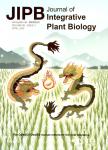Aluminium is essential for root growth and development of tea plants(Camellia sinensis)^∞
Aluminium is essential for root growth and development of tea plants(Camellia sinensis)作者机构:Root Biology CenterCollege of Resources and EnvironmentFujian Agriculture and Forestry UniversityFuzhou 350002China Vector-Borne Virus Research CenterFujian Agriculture and Forestry UniversityFuzhou 350002China Global Institute for Food SecurityUniversity of SaskatchewanSaskatoon S7N 4J8Canada
出 版 物:《Journal of Integrative Plant Biology》 (植物学报(英文版))
年 卷 期:2020年第62卷第7期
页 面:984-997页
核心收录:
学科分类:09[农学] 090203[农学-茶学] 0902[农学-园艺学]
基 金:This research was financially supported by the National Natural Science Foundation of China(31701989) MOA Modern Agricultural Talents Support Project and the Natural Science Foundation of Fujian Province in China(2017J01602)
摘 要:On acid soils,the trivalent aluminium ion(Al3+)predominates and is very rhizotoxic to most plant *** some native plant species adapted to acid soils including tea(Camellia sinensis),Al3+has been regarded as a beneficial mineral *** this study,we discovered that Al3+is actually essential for tea root growth and development in all the tested *** ion promoted new root growth in five representative tea varieties with dose-dependent responses to Al3+*** the absence of Al3+,the tea plants failed to generate new roots,and the root tips were damaged within 1 d of Al ***-tural analysis of root tips demonstrated that Al was required for root meristem development and *** situ morin@staining of Al3+in roots revealed that Al mainly localized to nuclei in root meristem cells,but then gradually moved to the cytosol when Al3+was subsequently *** movement of Al3+from nuclei to cytosols was accompanied by exacerbated DNA damage,which suggests that the nuclear-targeted Al primarily acts to maintain DNA *** together,these results provide novel evidence that Al3+is essential for root growth in tea plants through maintenance of DNA integrity in meristematic cells.



